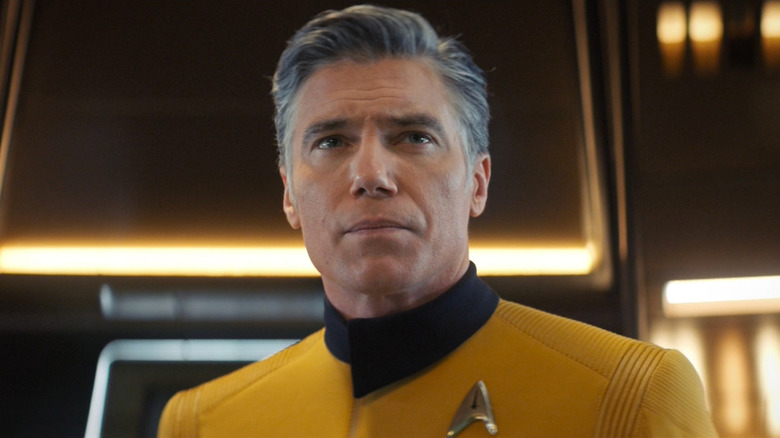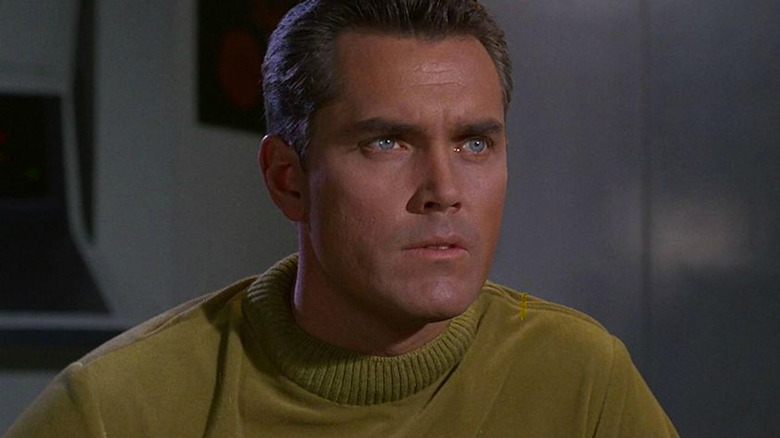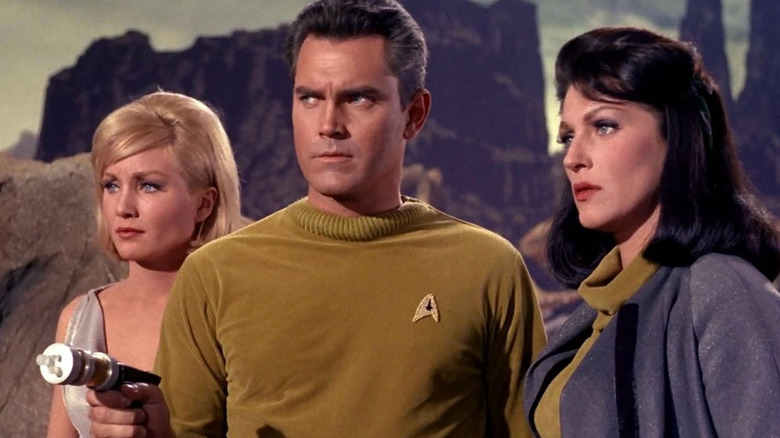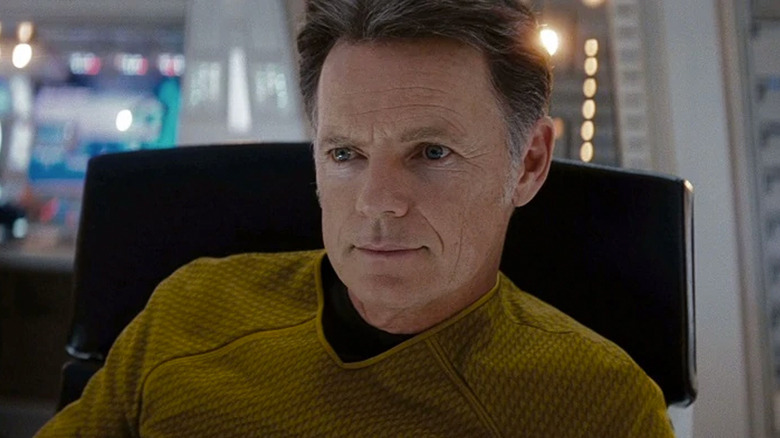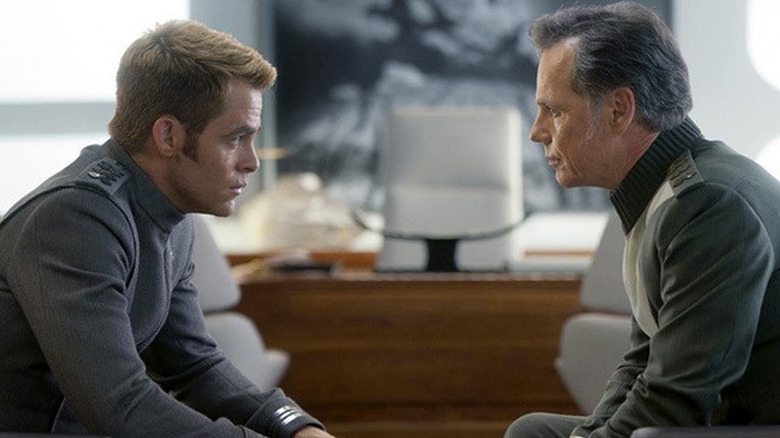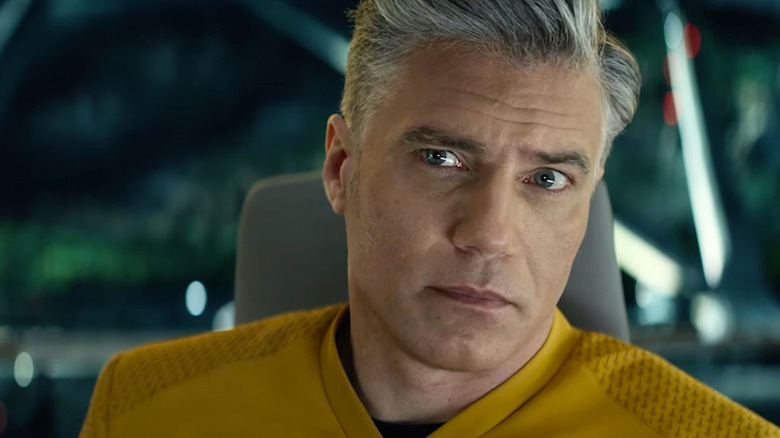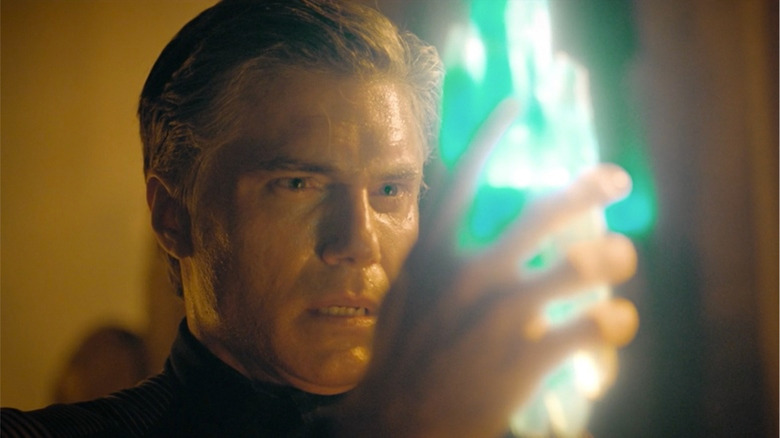A Guide To Every Version Of Captain Christopher Pike
Ah, Christopher Pike. The dashing, horseback-riding Starfleet captain has come to stand for more than just the U.S.S. Enterprise in the 60-odd years since he was first introduced. To many fans, Pike represents the best of Starfleet. His commitment to service, selflessness, and compassion is 100% in line with what "Star Trek" was always meant to represent, and it's what makes him the perfect subject for the franchise's trip down nostalgia lane in "Star Trek: Strange New Worlds."
Pike has had a long history in the realm of "Star Trek," though it might not feel that way for those looking in from the outside. He was the original protagonist in the unaired pilot of "The Original Series" before the episode was scrapped and later repurposed the two-part episode "The Menagerie." Decades would pass before Pike returned in J.J. Abrams' Kelvin Timeline-era "Trek" films, but by that time, he was already a favorite for many. Pike's role in season 2 "Star Trek: Discovery" and his leading role in "Strange New Worlds" mark his most significant contribution to the franchise to date — but each iteration of the character has brought something important to the franchise.
Introducing Jeffrey Hunter
In the world of "Trek," Pike is one of the earliest captains of the Enterprise, successor to the ship's first captain, Robert April, and immediate predecessor to James T. Kirk. "Star Trek" creator Gene Roddenberry envisioned Pike as a captain who, while skilled and capable, struggled with "self-doubt and the loneliness of command."
This and more was embodied by Jeffrey Hunter in the original series' initial pilot episode, "The Cage." When we first encounter the captain, he's grown very disillusioned with his responsibilities on the Enterprise. "I'm tired of deciding which mission is too risky and which isn't," Hunter-Pike grumbles in an early scene, "and who lives ... and who dies." He even has it in his mind to resign — that is, until he, his science officer Spock (Leonard Nimoy, of course) and first officer Number One (Majel Barrett) encounter a race of telepathic beings on the planet Talos IV.
Hunter-Pike is understandably prickly when he is abducted (and later experimented on) by the Talosians. The actor's performance is very much in line with those of his scenery-chewing contemporaries: there's no shortage of bluster or bravado in his take on Pike. It's not perfect — in fact, it might have been a bit too "stiff" for NBC's liking — but it's almost endearing that Hunter took the material so seriously. His gruff, no-nonsense captain was an unlikely fit for the extraterrestrial hijinks in "Star Trek." Hunter seemed just as baffled by the Talosians as audiences might have been watching the series for the first time, and it made him a great entry point for casual viewers.
What could have been
Hunter's angsty take on Pike isn't totally in line with the decorated Starfleet captain many have come to recognize in later iterations of the character, but he's compelling all the same. Plus, he had the star power to lead a show like "Star Trek." At the time of filming, science fiction was often not taken seriously by mass audiences. Someone like Hunter — a bankable "man's man" with matinee idol good looks and charisma to boot — could inject the series with some much-needed credibility.
While Hunter was a perfectly good protagonist, NBC didn't outright love "The Cage." The pilot was a bit too "cerebral" for the studio, not to mention slow — but they were sold enough on "Star Trek" to order a do-over in the form of a second pilot. Unfortunately, it'd have to be done without Hunter, who declined to return. That meant that the role of captain would be recast. William Shatner replaced Hunter's Pike in the original series, and went on to captain the Enterprise for three seasons and six movies.
"The Cage" would not be seen in its entirety for many years — the original cut of the episode aired on NBC once, in 1988 — but Pike was well on his way to becoming a legend regardless. In the '70s, Roddenberry would screen his own copy of "The Cage" for fans attending "Star Trek" conventions, and it made Pike something of a fan-favorite. Since so little was known about him, the unaired episode satisfied a bit of curiosity surrounding the character. Still, it'd take a long time for Pike to feasibly return in any capacity, given his affecting final appearance in "The Menagerie," where the former captain now lives with a devastating series of injuries following a terrible accident.
Return of the Pike
Bruce Greenwood's Captain Pike isn't exactly part of the One True Canon. J.J. Abrams' "Star Trek" film is half-reboot, half-fan fiction, as it takes place in an entirely different reality from that of Shatner's Enterprise. The adventures of Kirk (now Chris Pine), Spock (now Zachary Quinto) and the rest of the Enterprise crew kick off in a different direction when a jaded Romulan named Nero (Eric Bana) gets caught in a time-displacing black hole. This meant a new future for everyone, including Pike.
Kelvin-era Pike is likely the version of the captain that casual Trekkers are most familiar with. Greenwood's appearance in Abrams' 2009 film helped reinvigorate interest in an often-referenced but rarely-seen character; despite so few appearances, Greenwood had massive shoes to fill — and he did so quite well.
In this timeline, Pike shares a direct connection not only with Spock, but with Kirk as well. Nero's accidental time jump leads to the destruction of the U.S.S. Kelvin, the ship that Kirk's dad, George, captained for roughly 20 minutes before his untimely death. Kirk essentially enters the world just as his father leaves it, which means that he grows up very angsty and in desperate need of a father figure. Enter Christopher Pike.
The next generation
For the record, I really love Greenwood-Pike. He is, at the risk of getting poetic, a perfect storm of stern council and gentle empathy. Unlike Hunter's version of the character, he's perfectly content with his tenure as a Starfleet captain. He's also the one who convinces Kirk to join Starfleet in the first place. He's patient with his newly-minted cadets, he's cool under pressure, and he's got some of the best lines.
Unfortunately, as with the original series, Pike must eventually make way for Kirk whether we like it or not. He's very much a narrative catalyst, there to teach Kirk how to accept responsibility — or, as Spock so deftly explains in their first encounter, "to experience fear." When Pike is taken hostage by Nero, Kirk and Spock begin a tug-of-war for the captain's chair. Kirk believes that they're obligated to rescue Pike and stop Nero from destroying planet Earth. Spock, obviously, favors a more rational approach. Either way, Pike is essentially there to motivate the former, and gracefully retire when it's time for Kirk to take over the Enterprise. Not that it's a bad thing in the grand scheme: their quasi-familial dynamic really raises the stakes where it matters. Even though he's quickly killed off in the sequel, "Star Trek Into Darkness," we can tell this loss means a lot to Kirk, and so it means a lot to us.
Greenwood turned in such a solid performance as Pike. His take on the character suggests that the captain lived a full life, with an abundance of wild stories he'd gladly tell if anyone asked. Bringing Pike back in a larger capacity was an inspired move on the reboot's part, but it still left some fans wondering what he was really like in his prime.
Third time's the charm
Fortunately, though, fans no longer have to wonder. With Anson Mount's take on Captain Pike in "Discovery" — and now in "Strange New Worlds" — we finally have a chance to see his story on his own terms.
As far as Pikes go, Mount's take on the character is the most likely to hug you when you're sad. He carries the cool capability that both Hunter and Greenwood shared, but dials the fatherly benevolence to, like, an eight out of 10. His first appearance in "Discovery" was a welcome breath of fresh air for a characteristically bleak series. He embodies the hope and the optimism that made the original "Trek" adventures so popular, and though the series honors his history to the letter, it takes the opportunity to develop his character whenever possible.
"Discovery" introduces Pike fresh off his encounter at Talos IV, and it doesn't shy away from hinting at the captain's devastating future. In fact, Pike learns firsthand that he's essentially destined to have the accident explored in "The Menagerie." In the process of acquiring a time crystal on the planet Boreth, Pike experiences his future disfigurement as if it were happening to him in real time. He's cursed with the knowledge of that future, but he also has the option to change it — all he has to do is abandon the crystal. By taking it, he cements his fate for good.
Pike's difficult choice
What's so powerful about Pike's choice to take the time crystal is his commitment to his sensibilities, both as a member of Starfleet, and as a human being. He knows that his sacrifice will save the lives of five cadets, and he knows that the time crystal will save countless more. He chooses to do the right thing, the selfless thing — and he chooses to live his life to the fullest until the time comes.
If anyone was on the fence about Pike before, there's no way they felt the same way after. Regardless of his Herculean resolve, it's really hard not to like Mount-Pike. In a pop culture landscape peppered with irreverent anti-heroes and undisciplined Ryan Reynolds types, it's so refreshing to watch someone just ... be nice. Nice guys don't often last long in the world of science fiction, and maybe that's why Pike's history has been so chronically ill-fated. It's hard to make an interesting story about a kind dude making selfless decisions in the service of the greater good. But if "Star Trek" has taught us anything, it's definitely possible.
Knowing that Pike doesn't have long before his accident makes his solo series extremely bittersweet. In a way, though, that also makes "Strange New Worlds" all the more special. It's taken quite a long time to bring Pike center stage, but conditions are now ideal for his return. Even if it's not forever, Mount will surely make the most of what he's got, so why shouldn't we?
